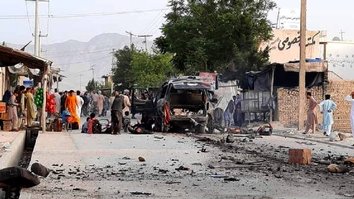KABUL -- Recent attacks across Afghanistan, some of which were claimed by the "Islamic State of Iraq and Syria" (ISIS), are likely to have devastating consequences for Afghans, observers warn.
On Friday (April 22), a day after a deadly attack in Mazar-e-Sharif was claimed by ISIS, a bomb ripped through a Sunni Sufi mosque in Imam Sahib district, Kunduz province, during prayers, killing at least 33 individuals and wounding 43 others.
Children were among the dead and injured, said Afghan officials.
No one has taken responsibility for the Kunduz attack but it bears the hallmarks of similar attacks carried out by ISIS.
An intelligence official said on condition of anonymity that the Kunduz explosion was caused by a bomb, but it was unclear how it was detonated.
An AFP correspondent saw large holes blown through the walls of Mawlavi Sikandar Sufi mosque, the mosque targeted on Friday.
One side of the mosque was destroyed.
Insurgent groups such as ISIS have deep hatred for Sufis whom they view as heretic.
"The sight at the mosque was horrifying. All worshippers inside the mosque were either injured or killed," Mohammad Esah, a shopkeeper who helped ferry victims to the district hospital, told AFP.
"I saw 20 to 30 bodies," another local resident said.
Relatives of victims arrived at the local hospital to look for their loved ones.
"My son is martyred," screamed one man, while a woman accompanied by her four children searched for her husband.
A nurse told AFP over the phone that 30 to 40 patients had been admitted for treatment of wounds.
"The shrapnel injuries ... show they were caused by a bomb explosion," a physician at the provincial hospital told AFP.
Sectarian divide
"The continuation and increase of such attacks and explosions will have dire and dangerous consequences and will make Afghanistan more insecure and unstable than the past," said Omar Nuhzat, a Kabul-based political affairs analyst.
"After the withdrawal of international forces from Afghanistan, unfortunately, recruitment by various terrorist groups, especially by ISIS, has increased."
"The Mazar-e-Sharif mosque and Kunduz province attacks are examples of an increase in ISIS's presence in the country," Nuhzat said.
"Such attacks will lead the country to a civil war and even disintegration."
ISIS's presence in Afghanistan could threaten world security, said Maqsood Hasanzada, another political affairs analyst in Kabul.
"It is very clear that these kinds of attacks and explosions are a wake-up call for Afghanistan. They will once again spread insecurity across the country that will also result in increasing poverty," he said.
"If the security situation continues to be like this and such explosions occur, ground for the growth of other terrorist and extremist groups, as well as for ethnic and religious tensions, will be provided in Afghanistan," he said.
"The systemic targeting of Shia is considered genocide and a crime against humanity, and the attack on the Sunni mosque in Kunduz shows that Afghanistan's enemies are conspiring to deepen ethnic and religious divisions among Afghans," Hasanzada said.
Afghanistan's enemies are attacking specific ethnic groups and sects in order to start ethnic and sectarian wars in Afghanistan so they can achieve their destructive goals, said Muhammad Hijrat, 23, a resident of Kabul.
"The killings of students, worshippers and civilians is not allowed in any religion, and we Afghans condemn it. ISIS or any other group that destroys the lives of innocent civilians is neither Muslim nor Afghan," Hijrat said.
[Hamza from Kabul contributed to this report.]

![A man who was injured in an explosion in Imam Sahib district, Kunduz province, receives treatment at a Kunduz hospital on April 22. [AFP]](/cnmi_st/images/2022/04/25/35110-000_328r2zw-585_329.jpg)







It looks like another game is about to begin after the withdrawal of US troops from Afghanistan. This time, ISIS is trying to intensify its terrorist activities in Afghanistan and beyond. People's unemployment, the Taliban's dictatorship, international intelligence plans, and countless sums of money have paved the way for the spread of ISIS in Afghanistan. The Taliban government should initially seek domestic and international legitimacy to attract international aid and save the people from unemployment. Then it is imperative that the Taliban, in consultation with the international partners, take serious actions to defeat ISIS.
Reply2 Comment
This article is about human deaths and injuries. How could anyone not like it? Inciting religious extremism to occur in Afghanistan has both internal and external dimensions. Saudi Arabia and Iran are trying to divide Afghanistan's religious communities. All these killings are being perpetrated by Pakistani intelligence. The world watches as Afghans are killed like sheep.
Reply2 Comment